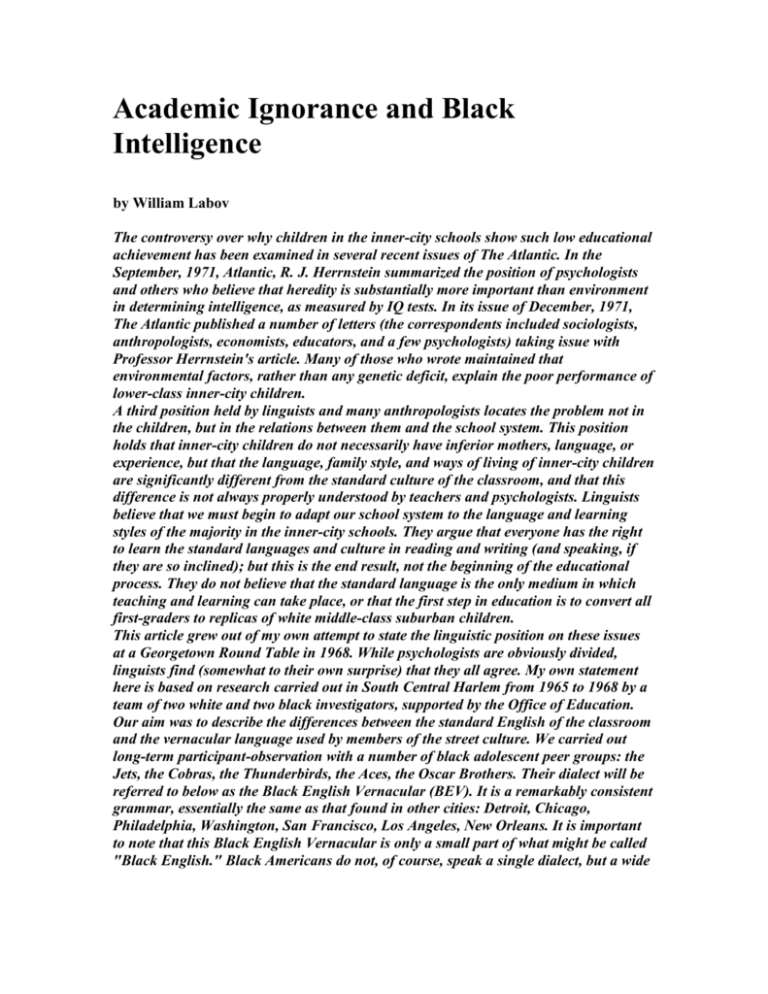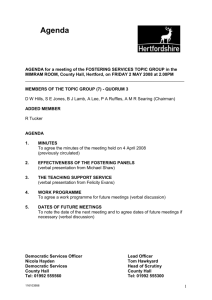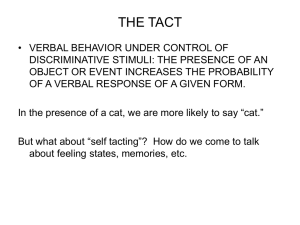
Academic Ignorance and Black
Intelligence
by William Labov
The controversy over why children in the inner-city schools show such low educational
achievement has been examined in several recent issues of The Atlantic. In the
September, 1971, Atlantic, R. J. Herrnstein summarized the position of psychologists
and others who believe that heredity is substantially more important than environment
in determining intelligence, as measured by IQ tests. In its issue of December, 1971,
The Atlantic published a number of letters (the correspondents included sociologists,
anthropologists, economists, educators, and a few psychologists) taking issue with
Professor Herrnstein's article. Many of those who wrote maintained that
environmental factors, rather than any genetic deficit, explain the poor performance of
lower-class inner-city children.
A third position held by linguists and many anthropologists locates the problem not in
the children, but in the relations between them and the school system. This position
holds that inner-city children do not necessarily have inferior mothers, language, or
experience, but that the language, family style, and ways of living of inner-city children
are significantly different from the standard culture of the classroom, and that this
difference is not always properly understood by teachers and psychologists. Linguists
believe that we must begin to adapt our school system to the language and learning
styles of the majority in the inner-city schools. They argue that everyone has the right
to learn the standard languages and culture in reading and writing (and speaking, if
they are so inclined); but this is the end result, not the beginning of the educational
process. They do not believe that the standard language is the only medium in which
teaching and learning can take place, or that the first step in education is to convert all
first-graders to replicas of white middle-class suburban children.
This article grew out of my own attempt to state the linguistic position on these issues
at a Georgetown Round Table in 1968. While psychologists are obviously divided,
linguists find (somewhat to their own surprise) that they all agree. My own statement
here is based on research carried out in South Central Harlem from 1965 to 1968 by a
team of two white and two black investigators, supported by the Office of Education.
Our aim was to describe the differences between the standard English of the classroom
and the vernacular language used by members of the street culture. We carried out
long-term participant-observation with a number of black adolescent peer groups: the
Jets, the Cobras, the Thunderbirds, the Aces, the Oscar Brothers. Their dialect will be
referred to below as the Black English Vernacular (BEV). It is a remarkably consistent
grammar, essentially the same as that found in other cities: Detroit, Chicago,
Philadelphia, Washington, San Francisco, Los Angeles, New Orleans. It is important
to note that this Black English Vernacular is only a small part of what might be called
"Black English." Black Americans do not, of course, speak a single dialect, but a wide
range of language forms that cover the continuum between this vernacular and the
most formal literary English. --W. L.
In the past decade, a great deal of federally sponsored research has been devoted to the
educational problems of children in ghetto schools. To account for the poor performance
of children in these schools, educational psychologists have tried to discover what kind of
disadvantage or defect the children are suffering from. The viewpoint which has been
widely accepted and used as the basis for large-scale intervention programs is that the
children show a cultural deficit as a result of an impoverished environment in their early
years. A great deal of attention has been given to language. In this area, the deficit theory
appears as the notion of "verbal deprivation": black children from the ghetto area are said
to receive little verbal stimulation, to hear very little well-formed language, and as a
result are impoverished in their means of verbal expression. It is said that they cannot
speak complete sentences, do not know the names of common objects, cannot form
concepts or convey logical thoughts.
Unfortunately, these notions are based upon the work of educational psychologists who
know very little about language and even less about black children. The concept of verbal
deprivation has no basis in social reality; in fact, black children in the urban ghettos
receive a great deal of verbal stimulation, hear more well-formed sentences than middleclass children, and participate fully in a highly verbal culture; they have the same basic
vocabulary, possess the same capacity for conceptual learning, and use the same logic as
anyone else who learns to speak and understand English. The myth of verbal deprivation
is particularly dangerous because it diverts the attention from real defects of our
educational system to imaginary defects of the child; and as we shall see, it leads its
sponsors inevitably to the hypothesis of the genetic inferiority of black children, which
the verbal-deprivation theory was designed to avoid.
The deficit theory attempts to account for a number of facts that are known to all of us:
that black children in the central urban ghettos do badly on all school subjects, including
arithmetic and reading. In reading, they average more than two years behind the national
norm. Furthermore, this lag is cumulative, so that they do worse comparatively in the
fifth grade than in the first grade. The information available suggests that this bad
performance is correlated most closely with socioeconomic status. Segregated ethnic
groups, however, seem to do worse than others: in particular, Indian, Mexican-American,
and black children.
We are obviously dealing with the effects of the caste system of American society-essentially a "color-marking" system. Everyone recognizes this. The question is, By what
mechanism does the color bar prevent children from learning to read? One answer is the
notion of "cultural deprivation" put forward by Martin Deutsch and others: the black
children are said to lack the favorable factors in their home environment which enable
middle-class children to do well in school. These factors involve the development,
through verbal interaction with adults, of various cognitive skills, including the ability to
reason abstractly, to speak fluently, and to focus upon long-range goals. In their
publications, the psychologists Deutsch, Irvin Katz, and Arthur Jensen also recognize
broader social factors. However, the deficit theory does not focus upon the interaction of
the black child with white society so much as on his failure to interact with his mother at
home. In the literature we find very little direct observation of verbal interaction in the
black home: most typically, the investigators ask the child if he has dinner with his
parents, and if he engages in dinner-table conversation with them. He is also asked
whether his family takes him on trips to museums and other cultural activities. This
slender thread of evidence is used to explain and interpret the large body of tests carried
out in the laboratory and in the school.
The most extreme view which proceeds from this orientation--and one that is now being
widely accepted--is that lower-class black children have no language at all. Some
educational psychologists first draw from the writings of the British social psychologist
Basil Bernstein the idea that "much of lower-class language consists of a kind of
incidental 'emotional accompaniment' to action here and now." Bernstein's views are
filtered through a strong bias against all forms of working-class behavior, so that he sees
middle-class language as superior in every respect--as "more abstract, and necessarily
somewhat more flexible, detailed and subtle." One can proceed through a range of such
views until one comes to the practical program of Carl Bereiter, Siegfried Engelmann,
and their associates. Bereiter's program for an academically oriented preschool is based
upon the premise that black children must have a language which they can learn, and
their empirical findings that these children come to school without such a language. In his
work with four-year-old black children from Urbana, Illinois, Bereiter reports that their
communication was by gestures, "single words," and "a series of badly connected words
or phrases," such as They mine and Me got juice. He reports that black children could not
ask questions, that "without exaggerating...these four-year-olds could make no statements
of any kind." Furthermore, when these children were asked, "Where is the book?" they
did not know enough to look at the table where the book was lying in order to answer.
Thus Bereiter concludes that the children's speech forms are nothing more than a series of
emotional cries. and he decides to treat them "as if the children had no language at all."
He identifies their speech with his interpretation of Bernstein's restricted code: "The
language of culturally deprived children...is not merely an underdeveloped version of
standard English, but is a basically non-logical mode of expressive behavior." The basic
program of his preschool is to teach them a new language devised by Engelmann, which
consists of a limited series of questions and answers such as Where is the squirrel? / The
squirrel is in the tree. The children will not be punished if they use their vernacular
speech on the playground, but they will not be allowed to use it in the schoolroom. If they
should answer the question "Where is the squirrel?" with the illogical vernacular form "In
the tree," they will be reprehended by various means and made to say, "The squirrel is in
the tree."
Linguists and psycholinguists who have worked with black children are likely to dismiss
this view of their language as utter nonsense. Yet there is no reason to reject Bereiter's
observations as spurious: they were certainly not made up. On the contrary they give us a
very clear view of the behavior of student and teacher which can be duplicated in any
classroom. Our own research is done outside the schools, in situations where adults are
not the dominant force, but on many occasions we have been asked to help analyze the
results of research into verbal deprivation in such test situations.
Here, for example. is a complete interview with a black boy, one of hundreds carried out
in a New York City school. The boy enters a room where there is a large, friendly white
interviewer, who puts on the table in front of him a block or a fire engine, and says, "Tell
me everything you can about this!" (The interviewer's further remarks are in parentheses.)
[12 seconds of silence]
(What would you say it looks like?)
[8 seconds of silence]
A spaceship.
(Hmmmmm.)
[13 seconds of silence]
Like a je-et.
[12 seconds of silence]
Like a plane.
[20 seconds of silence]
(What color is it?)
Orange. [2 seconds} An' whi-ite. [2 seconds]
An' green.
[6 seconds of silence]
(An' what could you use it for?)
[8 seconds of silence]
A je-et.
[6 seconds of silence]
(If you had two of them, what would you do with them?)
[6 seconds of silence]
Give one to some-body.
(Hmmm. Who do you think would like to have it?)
[10 seconds of silence]
Cla-rence.
(Mm. Where do you think we could get another one of these?)
At the store.
(Oh-ka-ay!)
We have here the same kind of defensive, monosyllabic behavior which is reported in
Bereiter's work. What is the situation that produces it? The child is in an asymmetrical
situation where anything he says can, literally, be held against him. He has learned a
number of devices to avoid saying anything in this situation, and he works very hard to
achieve this end.
If one takes this interview as a measure of the verbal capacity of the child, it must be as
his capacity to defend himself in a hostile and threatening situation. But unfortunately,
thousands of such interviews are used as evidence of the child's total verbal capacity, or
more simply his verbality: it is argued that this lack of "verbality" explains his poor
performance in school.
The verbal behavior which is shown by the child in the test situation quoted above is not
the result of ineptness of the interviewer. It is rather the result of regular sociolinguistic
factors operating upon adult and child in this asymmetrical situation. In our work in
urban ghetto areas, we have often encountered such behavior. For over a year Clarence
Robins had worked with the Thunderbirds, a group of boys ten to twelve years old who
were the dominant preadolescent group in a low-income project in Harlem. We then
decided to interview a few younger brothers of the Thunderbirds, eight to nine years old.
But our old approach didn't work. Here is an extract from the interview between Clarence
and eight-year-old Leon L.:
CR: What if you saw somebody kickin' somebody else on the ground, or was using a
stick, what would you do if you saw that?
LEON: Mmmm.
CR: If it was supposed to be a fair fight-LEON: I don' know.
CR: You don' know? Would you do anything?...huh? I can't hear you.
LEON: No.
CR: Did you ever see somebody get beat up real bad?
LEON: ...Nope ???
CR: Well--uh did you ever get into a fight with a guy?
LEON: Nope.
CR: That was bigger than you?
LEON: Nope.
CR: You never been in a fight?
LEON: Nope.
CR: Nobody ever pick on you?
LEON: Nope.
CR: Nobody ever hit you?
LEON: Nope.
CR: How come?
LEON: Ah 'on' know.
CR: Didn't you ever hit somebody?
LEON: Nope.
CR: [incredulous] You never hit nobody?
LEON: Mhm.
CR: Aww, ba-a-a-be, you ain't gonna tell me that.
This nonverbal behavior occurs in a relatively favorable context for adult-child
interaction, since the adult is a black man raised in Harlem, who knows this particular
neighborhood and these boys very well. He is a skilled interviewer who has obtained a
very high level of verbal response with techniques developed for a different age level,
and has an extraordinary advantage over most teachers or experimenters in these respects.
But even his skills and personality are ineffective in breaking down the social constraints
that prevail here.
When we reviewed the record of this interview with Leon. we decided to use it as a test
of our own knowledge of the sociolinguistic factors which control speech. We made the
following changes in the social situation; in the next interview with Leon, Clarence:
1. Brought along a supply of potato chips, changing the "interview" into something more
in the nature of a party.
2. Brought along Leon's best friend, eight-year-old Gregory.
3. Reduced the height imbalance. When Clarence got down on the floor of Leon's room,
he dropped from 6 feet, 2 inches to 3 feet, 6 inches.
4. Introduced taboo words and taboo topics, and proved to Leon's surprise that one can
say anything into our microphone without any fear of retaliation. It did not hit or bite
back. The result of these changes is a striking difference in the volume and style of
speech.
[The tape is punctuated throughout by the sound
of potato chips. ]
CR: Is there anybody who says. "Your momma drink pee"?
LEON: [rapidly and breathlessly] Yee-ah!
GREG: Yup.
LEON: And your father eat doo-doo for breakfas'!
CR: Ohhh! [laughs]
LEON: And they say your father--your father eat doo-doo for dinner!
GREG: When they sound on me, I say "C.B.M."
CR: What that mean?
LEON: Congo booger-snatch! [laughs]
GREG: Congo booger-snatcher! [laughs]
GREG: And sometimes I'll curse with "B.B."
CR: What that?
GREG: Oh, that's a "M.B.B." Black boy. [Leon crunching on potato chips]
GREG: 'Merican Black Boy.
CR: Oh.
GREG: Anyway, 'Mericans is same like white people, right?
LEON: And they talk about Allah.
CR: Oh, yeah?
GREG: Yeah.
CR: What they say about Allah?
LEON: Allah--Allah is God.
GREG: Allah-CR: And what else?
LEON: I don' know the res'.
GREG Allah i--Allah is God, Allah is the only God, Allah-LEON: Allah is the son of God.
GREG But can he make magic?
LEON: Nope.
GREG: I know who can make magic?
CR: Who can?
LEON: The God, the real one.
CR: Who can make magic?
GREG The son of po'--(CR: Hm?) I'm sayin' the po'k chop God! He only a po'k chop
God! [Leon chuckles]
The "nonverbal" Leon is now competing actively for the floor; Gregory and Leon talk to
each other as much as they do to the interviewer. The monosyllabic speaker who had
nothing to say about anything and could not remember what he did yesterday has
disappeared. Instead, we have two boys who have so much to say that they keep
interrupting each other, who seem to have no difficulty in using the English language to
express themselves.
One can now transfer this demonstration of the sociolinguistic control of speech to other
test situations, including IQ and reading tests in school. It should be immediately
apparent that none of the standard tests will come anywhere near measuring Leon's verbal
capacity. On these tests he will show up as very much the monosyllabic, inept, ignorant,
bumbling child of our first interview. The teacher has far less ability than Clarence
Robins to elicit speech from this child; Clarence knows the community, the things that
Leon has been doing, and the things that Leon would like to talk about. But the power
relationships in a one-to-one confrontation between adult and child are too asymmetrical.
This does not mean that some black children will not talk a great deal when alone with an
adult, or that an adult cannot get close to any child. It means that the social situation is the
most powerful determinant of verbal behavior and that an adult must enter into the right
social relation with a child if he wants to find out what a child can do. This is just what
many teachers cannot do.
The view of the black speech community which we obtain from our work in the ghetto
areas is precisely the opposite from that reported by Deutsch, Engelmann. and Bereiter.
We see a child bathed in verbal stimulation from morning to night. We see many speech
events which depend upon the competitive exhibitions of verbal skills: singing, sounding,
toasts, rifting, Iouding--a whole range of activities in which the individual gains status
through his use of language. We see the younger child trying to acquire these skills from
older children--hanging around on the outskirts of the older peer groups, and imitating
this behavior. We see, however, no connection between verbal skill at the speech events
characteristic of the street culture and success in the schoolroom; which says something
about classrooms rather than about a child's language.
There are undoubtedly many verbal skills which children from ghetto areas must learn in
order to do well in school, and some of these are indeed characteristic of middle-class
verbal behavior. Precision in spelling, practice in handling abstract symbols, the ability to
state explicitly the meaning of words, and a richer knowledge of the Latinate vocabulary
may all be useful acquisitions. But is it true that all of the middle-class verbal habits are
functional and desirable in school? Before we impose middle-class verbal style upon
children from other cultural groups, we should find out how much of it is useful for the
main work of analyzing and generalizing, and how much is merely stylistic--or even
dysfunctional. In high school and college, middle-class children spontaneously
complicate their syntax to the point that instructors despair of getting them to make their
language simpler and clearer.
Our work in the speech community makes it painfully obvious that in many ways
working-class speakers are more effective narrators, reasoners, and debaters than many
middle-class speakers, who temporize, qualify, and lose their argument in a mass of
irrelevant detail. Many academic writers try to rid themselves of the part of middle-class
style that is empty pretension, and keep the part necessary for precision. But the average
middle-class speaker that we encounter makes no such effort; he is enmeshed in verbiage,
the victim of sociolinguistic factors beyond his control.
I will not attempt to support this argument here with systematic quantitative evidence,
although it is possible to develop measures which show how far middle-class speakers
can wander from the point. I would like to contrast two speakers dealing with roughly the
same topic: matters of belief. The first is Larry H., a fifteen-year-old core member of
another group, the Jets. Larry is being interviewed here by John Lewis, our participantobserver among adolescents in South Central Harlem.
JL: What happens to you after you die? Do you know?
LARRY H: Yeah, I know. (What?) After they put you in the ground, your body turns
into--ah--bones, an' shit.
JL: What happens to your spirit?
LARRY: Your spirit--soon as you die, your spirit leaves you. (And where does the spirit
go?) Well, it all depends. (On what?) You know, like some people say if you re good an'
shit, your spirit goin' t'heaven...'n' if you bad, your spirit goin' to hell. Well, bullshit! Your
spirit goin' to hell anyway, good or bad.
JL: Why?
LARRY: Why? I'll tell you why. Cause. you see, doesn' nobody really know that it's a
God, y'know. 'cause, I mean I have seen black gods, pink gods, white gods, all color
gods. and don t nobody know it's really a God. An' when they be sayin' if you good, you
goin' t'heaven, thas bullshit. 'cause you ain't goin' to no heaven, 'cause it ain't no heaven
for you to go to.
Larry is a gifted speaker of the Black English vernacular (BEV) as opposed to standard
English (SE). His grammar shows a high concentration of such characteristic BEV forms
as negative inversion [don't nobody know], negative concord you ain't goin' to no
heaven], invariant be [when they be sayin ], dummy it for SE there [it ain't no heaven],
optional copula deletion [if you're good...if you bad], and full forms of auxiliaries [I have
seen]. The only SE influence in this passage is the one case of doesn't instead of the
invariant don't of BEV. Larry also provides a paradigmatic example of the rhetorical style
of BEV: he can sum up a complex argument in a few words, and the full force of his
opinions comes through without qualification or reservation. He is eminently quotable,
and his interviews give us a great many concise statements of the BEV point of view.
One can almost say that Larry speaks the BEV culture.
It is the logical form of this passage which is of particular interest here. Larry presents a
complex set of interdependent propositions which can be explicated by setting out the SE
equivalents in linear order. The basic argument is to deny the twin propositions:
(A) If you are good, (B) then your spirit
will go to heaven.
(not A) If you are bad. (C) then your spirit will go
to hell.
Larry denies (B), and allows that if (A) or (not A) is true, (C) will follow. His argument
may be outlined:
(1) Everyone has a different idea of what God is like.
(2) Therefore nobody really knows that God exists.
(3) If there is a heaven. it was made by God.
(4) If God doesn't exist, he couldn t have made heaven.
(5) Therefore heaven does not exist.
(6) You can't go somewhere that doesn't exist.
(not B) Therefore you can't go to heaven.
(C) Therefore you are going to hell.
This hypothetical argument is not carried on at a high level of seriousness. It is a game
played with ideas as counters, in which opponents use a wide variety of verbal devices to
win. There is no personal commitment to any of these propositions, and no reluctance to
strengthen one's argument by bending the rules of logic as in the (2, 4) sequence. But if
the opponent invokes the rules of logic, they hold. In John Lewis' interviews, he often
makes this move, and the force of his argument is always acknowledged and countered
within the rules of logic.
JL: Well, if there's no heaven, how could there be a hell?
LARRY: I mean--ye-eah. Well, let me tell you, it ain't no hell, 'cause this is hell right
here, y'know! (This is hell?) Yeah, this is hell right here!
Larry's answer is quick, ingenious, and decisive. The application of the (3-4-5) argument
to hell is denied, since hell is here, and therefore conclusion (not B) stands. These are not
ready-made or preconceived opinions, but new propositions devised to win the logical
argument in the game being played. The reader will note the speed and precision of
Larry's mental operations. He does not wander, or insert meaningless verbiage. It is often
said that the nonstandard vernacular is not suited for. dealing with abstract or
hypothetical questions, but in fact, speakers of the BE vernacular take great delight in
exercising their wit and logic on the most improbable and problematical matters. Despite
the fact that Larry H. does not believe in God, and has just denied all knowledge of him,
John Lewis advances the following hypothetical question:
JL: But, just say that there is a God, what color is he? White or black?
LARRY: Well, if it is a God...I wouldn' know what color, I couldn' say--couldn' nobody
say what-JL: But now, jus' suppose there was a God-LARRY: Unless'n they say...
JL: No, I was jus' sayin' jus' suppose there is a God, would he be white or black?
LARRY: He'd be white, man.
JL: Why?
LARRY: Why? I'll tell you why. 'Cause the average whitey out here got everything, you
dig? And the nigger ain't got shit, y'know? Y'unnerstan'? So--um--for--in order for that to
happen, you know it ain't no black God that's doin' that bullshit.
No one can hear Larry's answer to this question without being convinced of being in the
presence of a skilled speaker with great "verbal presence of mind," who can use the
English language expertly for many purposes.
Let us now turn to the second speaker, an upper middle-class, college-educated black
man being interviewed by Clarence Robins in our survey of adults in South Central
Harlem.
CR: Do you know of anything that someone can do, to have someone who has passed on
visit him in a dream?
CHAS M.: Well, I even heard my parents say that there is such a thing as something in
dreams, some things like that, and sometimes dreams do come true. I have personally
never had a dream come true. I've never dreamt that somebody was dying and they
actually died (Mhm), or that I was going to have ten dollars the next day and somehow I
got ten dollars in my pocket. (Mhm.) I don't particularly believe in that, I don't think it's
true. I do feel, though, that there is such a thing as--ah--witchcraft. I do feel that in certain
cultures there is such a thing as witchcraft, or some sort of science of witchcraft; I don't
think that it's just a matter of believing hard enough that there is such a thing as
witchcraft. I do believe that there is such a thing that a person can put himself in a state of
mind (Mhm), or that--er--something could be given them to intoxicate them in a certain-to a certain frame of mind--that--that could actually be considered witchcraft.
Charles M. is obviously a "good speaker" who strikes the listener as well-educated,
intelligent and sincere. He is a likable and attractive person--the kind of person that
middle-class listeners rate very high on a scale of "job suitability" and equally high as a
potential friend. His language is more moderate and tempered than Larry's: he makes
every effort to qualm his opinions, and seems anxious to avoid any misstatements or
overstatements. From these qualities emerges the primary characteristic of this passage-its verbosity. Words multiply, some modifying and qualifying, others repeating or
padding the main argument. The first half of this extract is a response to the initial
question on dreams, basically:
(1) Some people say that dreams sometimes come true.
(2) I have never had a dream come true.
(3) Therefore I don't believe (1).
This much of Charles M.'s response is well directed to the point of the question. He then
volunteers a statement of his beliefs about witchcraft which shows the difficulty of
middle-class speakers who (a) want to express a belief in something but (b) want to show
themselves as judicious, rational, and free from superstitions. The basic proposition can
be stated simply in five words:
But I believe in witchcraft.
However, the idea is enlarged to exactly one hundred words, and it is difficult to see what
else is being said. The vacuity of this passage becomes more evident if we remove
repetitions, fashionable words, and stylistic decorations:
But I believe in witchcraft.
I don't think witchcraft is just a belief.
A person can put himself or be put in a state of mind that is witchcraft.
Without the extra verbiage and the OK words like science, culture and intoxicate, Charles
M. appears as something less than a first-rate thinker. The initial impression of him as a
good speaker is simply our long-conditioned reaction to middle-class verbosity: we know
that people who use these stylistic devices are educated people, and we are inclined to
credit them with saying something intelligent.
Let us now examine Bereiter's own data on the verbal behavior of the black children he
dealt with. The expressions They mine and Me got juice are cited as examples of a
language which lacks the means for expressing logical relations--in this case
characterized as "a series of badly connected words." In the case of They mine, it is
apparent that Bereiter confuses the notions of logic and explicitness. We know that there
are many languages of the world which do not have a present copula, and which conjoin
subject and predicate complement without a verb. Russian, Hungarian, and Arabic may
be foreign, but they are not by the same token illogical. In the case of black English we
are not dealing with even this superficial grammatical difference, but rather with a lowlevel rule which carries contraction one step further to delete single consonants
representing the verbs is, have, or will. We have yet to find any children who do not
sometimes use the full forms of is or will, even though they may frequently delete it.
The deletion of the is or are in black English is not the result of erratic or illogical
behavior: it follows the same regular rules as standard English contraction. Wherever
standard English can contract, black children use either the contracted form or (more
commonly) the deleted zero form. Thus They mine corresponds to standard English
They're mine, not to the full form They are mine. On the other hand, no such deletion is
possible in positions where standard English cannot contract: just as one cannot say
That's what they're in standard English, That's what they is equally impossible in the
vernacular we are considering. The appropriate use of the deletion rule, like the
contraction rule, requires a deep and intimate knowledge of English grammar and
phonology. Such knowledge is not available for conscious inspection by native speakers:
the rules we have worked out for standard contraction have never appeared in any
grammar, and are certainly not a part of the conscious knowledge of any standard English
speakers. Nevertheless, the adult or child who uses these rules must have formed at some
level of psychological organization clear concepts of "tense marker," "verb phrase," "rule
ordering," "sentence embedding," "pronoun," and many other grammatical categories
which are essential parts of any logical system.
Bereiter's reaction to the sentence Me got juice is even more puzzling. If Bereiter believes
that Me got juice is not a logical expression, it can only be that he interprets the use of the
objective pronoun me as representing a difference in logical relationship to the verb; that
the child is in fact saying that "the juice got him" rather than "he got the juice"! If on the
other hand the child means "I got juice," then this sentence form shows only that he has
not learned the formal rules for the use of the subjective form I and oblique form me.
Bereiter shows even more profound ignorance of the rules of discourse and of syntax
when he rejects "In the tree" as an illogical or badly formed answer to "Where is the
squirrel?" Such elliptical answers are of course used by everyone, and they show the
appropriate deletion of subject and main verb, leaving the locative which is questioned by
wh + there. The reply In the tree demonstrates that the listener has been attentive to and
apprehended the syntax of the speaker. Whatever formal structure we wish to write for
expressions such as Yes or Home or In the tree, it is obvious that they cannot be
interpreted without knowing the structure of the question which preceded them, and that
they presuppose an understanding of the syntax of the question. Thus if you ask me,
"Where is the squirrel?" it is necessary for me to understand the sentence from an
underlying form which would otherwise have produced The squirrel is there. If the child
had answered The tree, or Squirrel the tree, or The in tree, we would then assume that he
did not understand the syntax of the full form, The squirrel is in the tree. Given the data
that Bereiter presents, we cannot conclude that the child has no grammar, but only that
the investigator does not understand the rules of grammar. It does not necessarily do any
harm to use the full form The squirrel is in the tree, if one wants to make fully explicit the
rules of grammar which the child has internalized. Much of logical analysis consists of
making explicit just that kind of internalized rule. But it is hard to believe that any good
can come from a program which begins with so many misconceptions about the input
data. Bereiter and Engelmann believe that in teaching the child to say The squirrel is in
the tree or This is a box and This is not a box, they are teaching him an entirely new
language, whereas in fact they are only teaching him to produce slightly different forms
of the language he already has.
If there is a failure of logic involved here, it is surely in the approach of the verbaldeprivation theorists, rather than in the mental abilities of the children concerned. We can
isolate six distinct steps in the reasoning which has led to programs such as those of
Deutsch, Bereiter, and Engelmann:
1. The lower-class child's verbal response to a formal and threatening situation is used to
demonstrate his lack of verbal capacity, or verbal deficit.
2. This verbal deficit is declared to be a major cause of the lower-class child's poor
performance in school.
3. Since middle-class children do better in school, middle-class speech habits are said to
be necessary for learning.
4. Class and ethnic differences in grammatical form are equated with differences in the
capacity for logical analysis.
5. Teaching the child to mimic certain formal speech patterns used by middle-class
teachers is seen as teaching him to think logically.
6. Children who learn these formal speech patterns are then said to be thinking logically,
and it is predicated that they will do much better in reading and arithmetic in the years to
follow.
This article has proved that numbers 1. and 2. at least are wrong. However, it is not too
naive to ask, What is wrong with being wrong? We have already conceded that black
children need help in analyzing language into its surface components, and in being more
explicit. But there are, in fact, serious and damaging consequences of the verbaldeprivation theory. These may be considered under two headings: (a) the theoretical bias
and (b) the consequences of failure.
It is widely recognized that the teacher's attitude toward the child is an important factor in
the latter's success or failure. The work of Robert Rosenthal on "self-fulfilling
prophecies" shows that the progress of children in the early grades can be dramatically
affected by a single random labeling of certain children as "intellectual bloomers." When
the everyday language of black children is stigmatized as "not a language at all" and "not
possessing the means for logical thought," the effect of such a labeling is repeated many
times during each day of the school year. Every time that a child uses a form of BEV
without the copula or with negative concord, he will be labeling himself for the teacher's
benefit as "illogical," as a "nonconceptual thinker." This notion gives teachers a readymade, theoretical basis for the prejudice they may already feel against the lower-class
black child and his language. When they hear him say I don't want none or They mine,
they will be hearing, through the bias provided by the verbal-deprivation theory, not an
English dialect different from theirs, but the primitive mentality of the savage mind.
But what if the teacher succeeds in training the child to use the new language
consistently? The verbal deprivation theory holds that this will lead to a whole chain of
successes in school, and that the child will be drawn away from the vernacular culture
into the middle-class world. Undoubtedly this will happen with a few isolated
individuals, just as it happens in every school system today for a few children. But we are
concerned not with the few but the many, and for the majority of black children the
distance between them and the school is bound to widen under this approach.
The essential fallacy of the verbal-deprivation theory lies in tracing the educational
failure of the child to his personal deficiencies. At present, these deficiencies are said to
be caused by his home environment. It is traditional to explain a child's failure in school
by his inadequacy; but when failure reaches such massive proportions, it seems necessary
to look at the social and cultural obstacles to learning and the inability of the school to
adjust to the social situation.
The second area in which the verbal-deprivation theory is doing serious harm to our
educational system is in the consequences of this failure and the reaction to it. As
Operation Head Start fails, the interpretations which we receive will be from the same
educational psychologists who designed this program. The fault will be found, not in the
data, the theory. or the methods used, but rather in the children who have failed to
respond to the opportunities offered them. When black children fail to show the
significant advance which the deprivation theory predicts, it will be further proof of the
profound gulf which separates their mental processes from those of civilized, middleclass mankind.
A sense of the failure of Operation Head Start is already commonplace. Some prominent
figures In the program have reacted to this situation by saying that intervention did not
take place early enough. Bettye M. Caldwell notes that
"the research literature of the last decade dealing with social-class differences has made
abundantly clear that all parents are not qualified to provide even the basic essentials of
physical and psychological care to their children."
The deficit theory now begins to focus on the "longstanding patterns of parental deficit"
which fill the literature. "There is, perhaps unfortunately," writes Caldwell, "no literacy
test for motherhood." Failing such eugenic measures, she has proposed "educationally
oriented day care for culturally deprived children between six months and three years of
age." The children are returned home each evening to "maintain primary emotional
relationships with their own families," but during the day they are removed "hopefully to
prevent the deceleration in rate of development which seems to occur in many deprived
children around the age of two to three years."
There are others who feel that even the best of the intervention programs, such as those of
Bereiter and Engelmann, will not help the black child no matter when they are applied-that we are faced once again with the "inevitable hypothesis" of the genetic inferiority of
the black people. Arthur Jensen, for example, in his Harvard Educational Review paper
(1969), argues that the verbal-deprivation theorists with whom he has been associated-Deutsch, Whiteman, Katz, Bereiter--have been given every opportunity to prove their
case and have failed. This opinion forms part of the argument leading to his overall
conclusion that the "preponderance of the evidence is...less consistent with a strictly
environmental hypothesis than with the genetic hypothesis."
Jensen argues that the middle-class white population is differentiated from the workingclass white and black population in the ability for "cognitive or conceptual learning,"
which Jensen calls Level II intelligence as against mere "associative learning," or Level I
intelligence.
Thus Jensen found that one group of middle-class children were helped by their conceptforming ability to recall twenty familiar objects that could be classified into four
categories: animals, furniture, clothing, or foods. Lower-class black children did just as
well as middle-class children with a miscellaneous set, but showed no improvement with
objects that could be so organized.
In the earliest stages of language learning, children acquire "selectional restrictions" in
their use of words. For example, they learn that some verbs take ANIMATE subjects, but
others only INANIMATE ones: thus we say The machine breaks but not John breaks;
The paper tears but not George tears. A speaker of English must master such subtle
categories as the things which break, like boards, glasses, and ropes; things which tear,
like shirts, paper, and skin; things which snap, like buttons, potato chips, and plastic, and
other categories which smash, crumple, or go bust.
In studies of Samoan children, Keith Kernan has shown that similar rules are learned
reliably long before the grammatical particles that mark tense, number, and so on. The
experimentation on free recall that Jensen reports ignores such abilities, and defines
intelligence as a particular way of answering a particular kind of question within a narrow
cultural framework. Recent work of anthropologists in other cultures is beginning to
make some headway in discovering how our tests bias the results so as to make normally
intelligent people look stupid. Michael Cole and his associates gave the same kind of free
recall tests to Kpelle speakers in Liberia. Those who had not been to school--children or
adults--could only remember eight or ten out of the twenty and showed no "clustering"
according to categories, no matter how long the trials went on. Yet one simple change in
the test method produced a surprising change. The interviewer took each of the objects to
be remembered and held it over a chair: one chair for each category, or just one chair for
all categories. Suddenly the Kpelle subjects showed a dramatic improvement,
remembered seventeen to eighteen objects, and matched American subjects in both recall
and the amount of clustering by categories. We do not understand this effect, for we are
only beginning to discover the subtle biases built in our test methods which prevent
people from using the abilities that they display in their language and in everyday life.
Linguists are in an excellent position to demonstrate the fallacies of the verbaldeprivation theory. All linguists agree that nonstandard dialects are highly structured
systems; they do not see these dialects as accumulations of errors caused by the failure of
their speakers to master standard English. When linguists hear black children saying He
crazy or Her my friend they do not hear a "primitive language." Nor do they believe that
the speech of working-class people is merely a form of emotional expression, incapable
of relating logical thought. Linguists therefore condemn with a single voice Bereiter's
view that the vernacular can be disregarded.
There is no reason to believe that any nonstandard vernacular is in itself an obstacle to
learning. The chief problem is ignorance of language on the part of all concerned. Our
job as linguists is to remedy this ignorance: Bereiter and Engelmann want to reinforce it
and justify it. Teachers are now being told to ignore the language of black children as
unworthy of attention and useless for learning. They are being taught to hear every
natural utterance of the child as evidence of his mental inferiority. As linguists we are
unanimous in condemning this view as bad observation, bad theory, and bad practice.
That educational psychology should be strongly influenced by a theory so false to the
facts of language is unfortunate; but that children should be the victims of this ignorance
is intolerable. If linguists can contribute some of their valuable knowledge and energy
toward exposing the fallacies of the verbal-deprivation theory, we will have done a great
deal to justify the support that society has given to basic research in our field.
-----------------------------------------------------------------------Copyright © 1972 by William Labov. All rights reserved.









